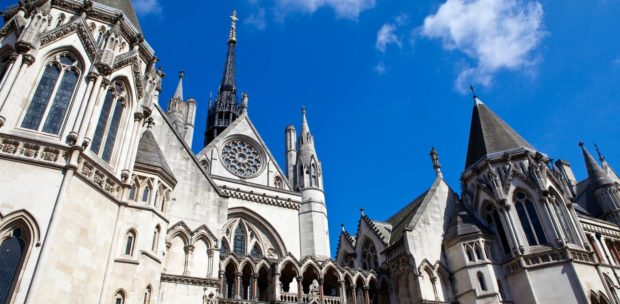You have no items in your cart. Want to get some nice things?
Go shopping
IN THE HIGH COURT OF JUSTICE
QUEEN’S BENCH DIVISION
THE ADMINISTRATIVE COURT
Before:
MR JUSTICE EVANS
Between:
JASON GREENE
Appellant
-v-
THE CITIZENS’ HEALTH COMMISSIONER
Respondent
Judgment
Introduction
1. This is an appeal against the decision of the Citizens’ Health Commissioner (‘the Commissioner’) to refuse to grant a licence under Section 20 of the British Rights Act (‘the Act’).
2. In April of this year the appellant, Jason Greene, applied for a Section 20 licence. In May, the Commissioner notified the appellant that his application had been refused. The reason given for this refusal was that the statutory criterion for obtaining a licence had not been satisfied. The issue for this court to consider is whether that was indeed the case.
Factual Background
3. The appellant is 26 years old. He lives with his wife, Joanna, in a two-bedroom flat in North East London. They have been married for 5 years, but have lived together for 7, and have been in a relationship for 8. They have no children.
4. Although the appellant does not own his home, he does own one car, and has around £5,000 of savings spread across two separate bank accounts. Evidence of these funds has been shown to me with a view to demonstrating that the appellant and his wife are financially stable.
5. The appellant left school when he was 16 years old, so did not receive a full secondary education. However, he did secure an apprenticeship with a construction firm, and has since completed numerous courses, specializing in bricklaying. He is now in his fifth year of employment with his current company, Mason’s Masons, and I have been presented with four character references written by his colleagues and superiors. By all accounts, he is a diligent, industrious, trustworthy and courteous employee.
6. The appellant underwent the Mandatory Paternity Programme (‘the Programme’) 7 years ago, when he was 19 years old.
7. The appellant’s wife is employed as a staff nurse at the Royal North London Children’s Facility. She took up this position 3 years ago, after completing specialist paediatric training with the Greater London Health Authority. I have been presented with three character references relating to Mrs Greene: one from her current supervisor, one from a colleague, and one from her line manager. Each reference documents, in some detail, her devotion to the children she treats, frequently working in excess of her allotted hours in order to assist with the care of those who are vulnerable and traumatized.
8. Finally, I note that the appellant pleaded guilty to one charge of theft 6 years ago. He received a community-based sentence, and although he does not appear to have offended since then, his brother, his cousin, and his uncle are all known to the police. The appellant’s wife does not appear to have a criminal history.
9. In April of this year the appellant provided the Commissioner with all of this information as part of his written licence application. He included supporting documentation, as required, and attended an interview with the Commissioner’s office, as is now standard. None of the aforementioned facts are in dispute.
Legal framework: Sections 18 to 21 of the British Rights Act
10. Section 18 of the Act provides for the government to create a Mandatory Paternity Programme, to be overseen and administered by the Commissioner and his office. The Programme is now in its tenth year.
11. The Programme requires all ‘eligible persons’ to do two things: first, to register with their local health authority, and second, to undergo ‘the standard procedure’. This procedure is defined in Section 18(2) as a vasectomy.
12. Section 18(3) defines ‘eligible person’ as any person who:
a. is male;
b. is resident in Britain;
c. is aged between 16 and 60 years old;
d. is sexually active;
e. is of the relevant means.
13. Section 18(4) defines a ‘sexually active’ person as any person who is not already sterile, and defines ‘the relevant means’ as having an income that is below the ninety-eighth percentile.
14. Section 19 of the Act creates the offences of failing to register with a local health authority, failing to undergo the standard procedure, and fathering children without a licence. All of these are punishable by 12 months’ imprisonment, the withdrawal of employment rights, and the termination or confiscation of any children conceived illegally.
15. Section 20 of the Act provides that, having undergone the standard procedure, any eligible person may apply to the Commissioner to obtain a licence which permits (i) the reversal of the procedure, and (ii) the fathering of children. The sole criterion for the granting of such a licence is that the applicant proves himself to be ‘a fit and proper person’, and thus deserving of paternity rights.
16. Section 20(2) states that when the Commissioner is assessing whether an applicant for a licence is a fit and proper person, he must have regard to the following considerations:
a. the applicant’s means, and whether he is financially stable;
b. the applicant’s background, which includes ethnic, religious, and social ties;
c. the applicant’s domestic circumstances, and whether he enjoys domestic stability;
d. the applicant’s family, and the risk that may be posed by the replication of biological traits;
e. the public interest.
18. Section 21 provides that when the Commissioner refuses to grant a licence, the applicant shall have an automatic right of appeal against that decision. Appeal lies to this court. The appellant is now exercising this right of appeal, arguing that the Commissioner’s decision was wrong. He appears alone, without legal representation.
Discussion
18. The sole issue in this case is whether the appellant satisfies the statutory criterion for the granting of a licence: that is, whether he is a fit and proper person and as such, deserving of paternity rights. The Commissioner’s office has failed to provide either the appellant or this court with anything approaching an explanation for its original decision, but I note that it is under no obligation to do so.
19. In assessing the appellant’s licence application, it is helpful to consider the purpose of the Programme and its licensing regime. This was laid out by the Home Secretary, Sir Harvey Jenkins MP, as the Bill made its way through Parliament. I quote from Hansard:
The policy that is contained in this Bill will safeguard not merely the future of the British people, but also their flourishing. It will act as a critical brake on our great nation’s population growth, allowing us to manage the resources we have at our disposal in a fair and responsible way – both the natural resources of the living world, and the man-made resources of capital and concrete. And it will ensure that ours is a truly meritocratic society, in which only those who have proved themselves to be deserving are permitted to enjoy the ultimate privilege: that of imitating God by creating life. Perhaps most importantly, though, it will secure our legacy by guaranteeing that only the brightest, only the best, only the most noble amongst us are entrusted with taking our country forward. When one reflects upon this trans-generational scope, it is difficult to conceive of a policy that would be more beneficial to the great British people.
20. The appellant argues that he is a fit and proper person on the following grounds (turning to the considerations listed at paragraph 16, above):
a. Means: he and his wife are financially stable, with regular income and savings of around £5,000;
b. Background: neither he nor his wife are affiliated with any ethnic, religious, or social group that might compromise their fealty to the British state;
c. Domestic circumstances: he and his wife have been in a relationship for around 8 years, without interruption, and there is no reason to think that this will not continue;
d. Family: although there are members of the appellant’s family who have been convicted of criminal offences, they are effectively estranged;
e. Public interest: granting a licence to the appellant would serve the public interest in two ways: first, by demonstrating how the privilege of parenting could be earned; and second, by allowing the appellant to serve the British state by raising a child who embodies its values.
21. The appellant’s efforts in arguing his case are laudable, and much of what he says is true. I fully accept that he has achieved a level of domestic and financial stability, but his application is haunted by the spectre of criminality.
22. In respect of his own criminal history, he has argued that the case of Cathcart v The Citizen’s Health Commissioner establishes that a single criminal conviction need not preclude the awarding of a licence to an individual who otherwise meets the criterion. However, the facts of this case are quite different from those in Cathcart.
23. First, the appellant’s conviction is for theft: an offence of dishonesty. The very existence of this conviction shows him to be a dishonest and deceitful man. Such an individual will never be deserving of paternity rights, and it is plainly not in the public interest for his criminal tendencies to be replicated. In contrast, in the case of Cathcart,Lord Cathcart’s conviction was for driving with excess alcohol, which does not reflect any equivalent underlying flaws.
24. Second, Lord Cathcart was and remains a public figure of considerable wealth and repute. Any man of his stature will be deserving of paternity rights, and it will always be in the public interest for the traits of such esteemed individuals to be replicated. The appellant holds no comparable social status.
25. I note that I am also deeply concerned by the appellant’s family background. Although he claims to be estranged from the criminals within his family, his own criminal history strongly suggests a link between his character and theirs. Naturally, this heightens the suspicion that his criminality would be replicated in any child that he has, and thus lends support to the view that the granting of a licence would be wholly inappropriate.
26. Finally, I do not accept the argument that granting the appellant a licence would be in the public interest because it would (i) demonstrate how the privilege of parenting could be earned and (ii) allow the appellant to serve the state. The public are well aware of how the privilege of parenting can be earned, and the appellant may serve the state in any number of alternative ways.
27. I applaud the appellant and his wife for the ardour and tenacity with which they have pursued this appeal. I also recognise that they are hard-working Britons who, in another time, might have made satisfactory parents. However, Parliament has made it clear that only the most exceptional among us are deserving of paternity rights, and the appellant does not fall within that category. His criminal history and connections render him an unfit and improper person; one who is not and never will be worthy of the great privilege of creating life. Granting a licence to such an individual would fundamentally undermine the purpose of the Programme, as outlined in paragraph 19, above.
28. For all of these reasons I dismiss the appellant’s appeal and make a Standard Costs Order against him for bringing his case before me. This is to be paid within 7 days.

About Stephen Reynolds
Until recently, Stephen practised as a criminal barrister in London. He is now on sabbatical, writing his first novel. Before being called to the Bar, he studied and lectured in philosophy. His fiction can be found here: www.thishumanwrites.co.uk
- Web |
- More Posts(1)




